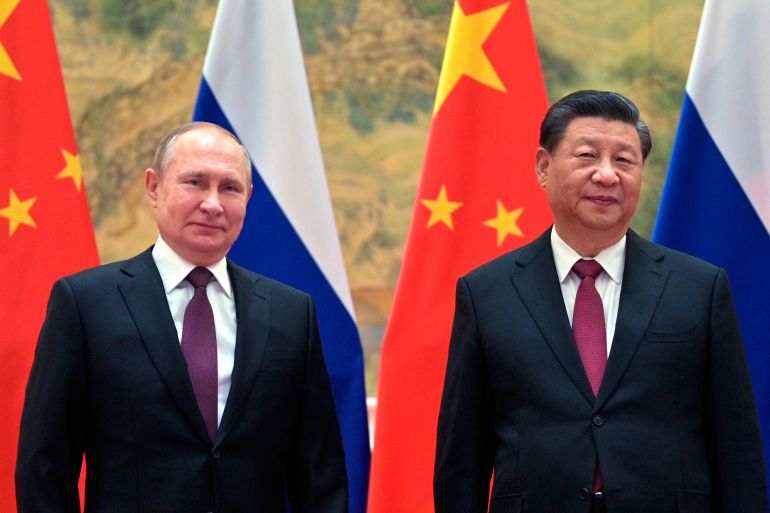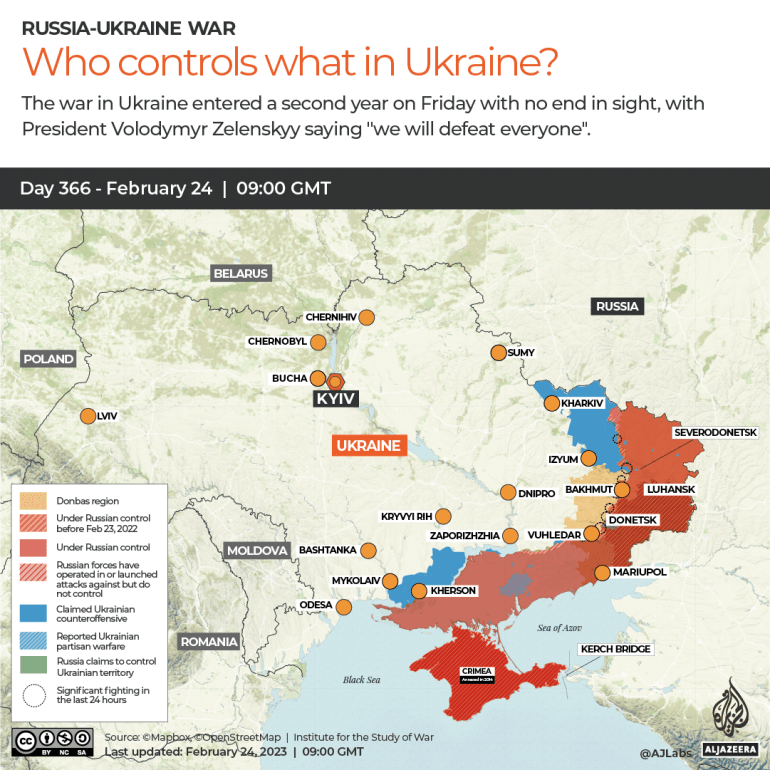All you need to know about China’s plan for Russia-Ukraine talks
Beijing has released its 12-point position paper, calling for a ceasefire between Kyiv and Moscow.

China has released its much-anticipated position paper on the Russia-Ukraine war, in which it calls for a ceasefire and talks between the two parties.
Conflict and war “benefit no one”, China said on Friday in the 12-point paper, timed to coincide with the first anniversary of Russia’s invasion of neighbouring Ukraine.
Keep reading
list of 4 items‘They don’t have spirit and lack motivation, those Russians’
Russia’s Medvedev floats idea of pushing back Poland’s borders
Ukraine’s Bravehearts: From filmmakers to war veterans
“All parties must stay rational and exercise restraint, avoid fanning the flames and aggravating tensions, and prevent the crisis from deteriorating further or even spiralling out of control,” it said.
What is in the plan?
Released by the foreign ministry, the plan urges an end to Western sanctions against Russia, the establishment of humanitarian corridors for the evacuation of civilians and steps to ensure the export of grain after disruptions caused global food prices to spike last year.
The proposal mainly elaborates on long-held Chinese positions, including that all countries’ “sovereignty, independence and territorial integrity be effectively guaranteed”.
It said nuclear power plants must be kept safe and the threat or use of nuclear weapons should be opposed.
The plan also called for an end to the “Cold War mentality”, which is Beijing’s standard term for what it regards as global dominance by the United States and its interference in other countries’ affairs.

How has Ukraine reacted?
Ukrainian President Volodymyr Zelenskyy said Kyiv needed to cooperate with China to put an end to the war.
“China started talking about Ukraine, and that’s not bad,” Zelenskyy said. “It seems to me that there is respect for our territorial integrity, security issues.”
“We need to work with China on this point. … Our task is to unite everyone in order to isolate one,” he added.
Mykhailo Podolyak, a senior adviser to Ukraine’s president, said any plan to end Russia’s war in Ukraine must involve the withdrawal of Moscow’s troops back to Ukraine’s 1991 borders at the time of the Soviet Union’s collapse.
“Any ‘peace plan’ with ceasefire only and, as a result, a new delimitation line and continued occupation of Ukrainian territory isn’t about peace, but about freezing the war, a Ukrainian defeat, [and the] next stages of Russia’s genocide,” he said in a post on Twitter.
“Ukraine’s position is known – the withdrawal of Russian troops to the borders of 1991,” he said.
Any "peace plan" with ceasefire only and, as a result, a new delimitation line and continued occupation of 🇺🇦 territory isn’t about peace, but about freezing the war, 🇺🇦 defeat, next stages of 🇷🇺 genocide.
🇺🇦 position is known – the withdrawal of 🇷🇺 troops to the borders of 1991— Михайло Подоляк (@Podolyak_M) February 24, 2023
Earlier, Ukraine’s first deputy foreign minister told Al Jazeera that the country welcomes China’s proposal to mediate between Kyiv and Moscow.
“We welcome any initiative that is actually aimed at finding peace and resolving the war,” Emine Dzhaparova told Al Jazeera from Kyiv. “… We are the country that is most interested in having any kind of peace because we’ve been suffering this hell for a year.”
“The document … that we received today in the morning is called the political position of China about the crisis. We will study it thoroughly,” she added. “The only thing that I want to clarify is what is the basis for this peace because we believe in justice and fair peace, not appeasement.”
How have Western allies reacted?
The 12-point document did not reveal any new initiatives, and Western diplomats and experts reacted with scepticism and disappointment, noting that China is not neutral and has not condemned Russia’s invasion.
NATO Secretary General Jens Stoltenberg said Beijing was not well-placed to negotiate an end to the war.
“China doesn’t have much credibility because they have not been able to condemn the illegal invasion of Ukraine,” he told reporters in Tallinn, adding that Beijing had signed an agreement with Russian President Vladimir Putin days before the invasion.
European Commission President Ursula von der Leyen echoed Stoltenberg’s sentiments, saying China had not shared a peace plan but some principles.
“You have to see them against a specific backdrop, and that is the backdrop that China has already taken sides by signing, for example, an unlimited friendship right before the invasion,” she said.
“So we will look at the principles, of course, but we will look at them against the backdrop that China has taken sides,” the former German defence minister said.
A spokesperson for Germany’s government noted important elements, such as a call for the withdrawal of Russian forces, were missing from the proposal.
“It is important that China now discusses these ideas directly with Ukraine as this is the only way to find a balanced solution that takes Ukraine’s legitimate interests into account,” the spokesperson said.
What do experts say?
Nicholas Bequelin, visiting fellow at Yale Law School’s Paul Tsai China Center, told Al Jazeera that China can’t be an effective mediator in the Russia-Ukraine war and the proposals put out “reflects this”.
“This is not a plan; there is no action that China proposes,” Bequelin said. “What it does is it articulates a set of principles about the way China sees this conflict. China really is in a bind over the Ukraine conflict because it doesn’t welcome the war. It causes untold problems to China in its relationship with Europe, to its economy, to its place in the world.
“At the same time, what is deeply ingraining Beijing’s views of the world is that a showdown with the US is on the horizon,” he said. “Sooner or later, a showdown with the West will happen because the West is trying to contain China’s rise, and as a result, it cannot afford to forgo an ally like Russia. So it has to pretend to be neutral while staying somewhat on the side of Russia and certainly not accepting to be enrolled in the war efforts waged by the US and NATO.”